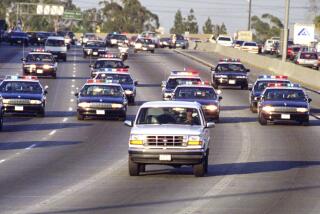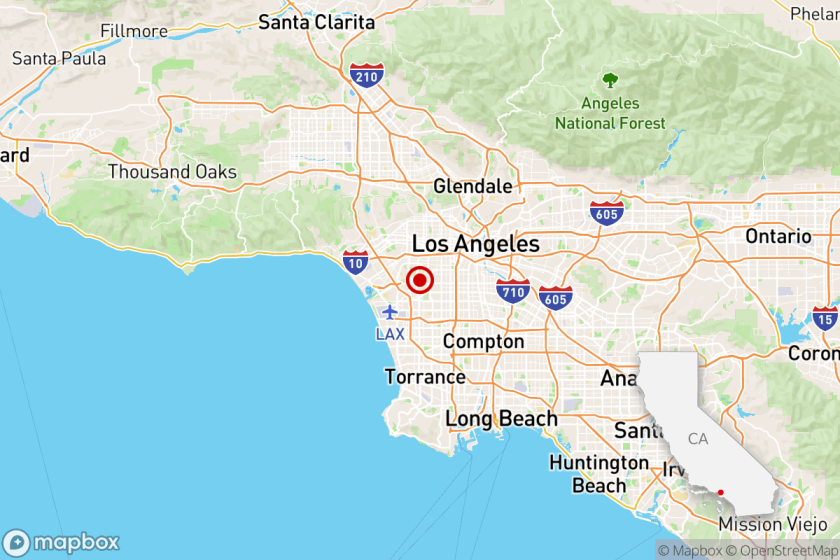Cop befriends a crook
Sgt. Jerry Wooters first encountered Jack “the Enforcer” Whalen at Hollywood’s Mark Twain Hotel, which served as an office of sorts for the big man trying to fill the void left by the jailing of Mickey Cohen.
Whalen was imposing -- some swore he was 6-foot-4, 250 -- and had the thickest hands anyone had seen. He’d once clobbered a dance instructor in the lobby of the Mark Twain to collect a $15 debt. Now he was messing with two members of the Gangster Squad, who called for backup.
“They said, ‘We tried to place him under arrest and he wouldn’t come,’ ” Wooters recalled. “So I went over to him, all my 165 pounds, and I said, ‘Whalen, I understand you’re a tough guy, really good fighter.’ He said, ‘Where’s your badge?’
“So I said, ‘Now do you want to go easy, or want to go hard?’
“He says, ‘Dick, what’s your name?’ So I tell him.” Whalen flashed a smile befitting a movie star and said: “Oh, hiya, Jerry. I heard about you.”
And that’s how the renegade cop met the renegade gangster and how they became friends for life, or however long life could last, in Los Angeles of the 1950s, for someone named Jack “the Enforcer.”
Whalen might well have heard of Jerry Wooters, for things had a way of happening around the charming rogue of a cop who exuded a screw-you edge to crooks and his bosses alike. He’d joined the force on a lark in 1941 when a friend said, “ ‘The police are giving an exam. Let’s go down and take it.’ It cost a buck.”
The LAPD was filling its ranks after its purges of the 1930s, when a mayor and police chief sold promotions and a secret unit planted a bomb under the car of a city reformer. Wooters paid his $1 and became part of the generation that was supposed to change all that.
In one of his first raids as a vice officer, 20 suspects escaped a gambling house when he tangled with the home’s pet terrier, earning the headline: “Faithful Fido Mutilates Seat of Raiding Officer’s Pants.”
Later, Wooters boasted how he was going to avoid the war by enlisting in a reserve unit at a movie studio. Then he arrested a judge’s nephew at a gay bar, and, BOOM, they sent him to the Pacific in a B-17 and gave him a big Brownie camera to take pictures of Japanese positions.
Over Guadalcanal, an enemy round blew the head off the gunner next to him. Later, a shell crippled the plane, leaving the crew adrift in a raft. They were certain a Japanese patrol would finish them off, but Wooters bet the others that an American destroyer would get to them first, on the fifth day. “I won $30,” he said.
After he came home with his medals, that penchant for gambling eventually landed him on the Gangster Squad. Wooters was a uniformed sergeant along Wilshire when he crashed its Christmas party. The secretive unit had invited some civilians who quietly helped it, as in setting up a front company to lease phone lines that carried signals from bugs planted around town.
One squad member blew a gasket when he saw the scene in a back room: Someone they had not invited, a cop no less, was down on the floor, a cigarette dangling from his mouth, trying to separate some of those civilians from their money.
“Well, you know, God dang, to have a man in uniform, especially a supervisor, playing craps, which was illegal,” recalled Con Keeler, the squad’s bugging expert.
Imagine his surprise when Sgt. Wooters joined their ranks.
With Mickey Cohen sidelined by a tax case, the LAPD saw an opening to crush bookmaking in the city. The Gangster Squad needed a sergeant who really knew the world of bookies. Wooters had worked them during his time in vice.
Thus did it take on the cop who would enrage Mickey and lead the investigation that changed the rules for policing in California, that in his first assignment.
Charles Cahan had been a runner for a bookie, then overnight, “he had about six joints . . . the Cadillac convertible . . . all the fancy broads,” Wooters recalled. “[Chief] Parker said, ‘I want this son of a bitch in jail.’ ”
No problem. Cahan operated out of houses, stationing phone clerks upstairs. The squad would sneak in at night and hide microphones. The squad’s budding electronics genius, Bert Phelps, used Wheaties from the kitchen as glue to reattach a piece of wallpaper -- a flower -- over a bug in a wall. After they picked up Cahan and 14 others in April 1953, the cops were matter-of-fact at the trial. No, they hadn’t bothered with warrants. How did they get through a door? “Kicked it open.” A window? “With my foot.”
Wooters insisted he warned prosecutors to protest when defense lawyers began harping about a bug under a dresser. He told the district attorney, “You’ve got to bring out that this is not a bedroom -- you can’t violate a man’s bedroom.” All he got back was “Jesus Christ, who’s prosecuting this case?” It was no different than what they’d done for years, after all.
Then the state Supreme Court had its say on the Cahan case on April 27, 1955, and found “flagrant violation of the United States Constitution.” The ruling named names, starting with Wooters’, whose “intelligence unit” had done stuff like breaking and entering, and bugging bedrooms, that “would be almost incredible if it were not admitted.”
That’s how California got the Exclusionary Rule, mandating that evidence illegally obtained could not be used in court. The message was clear, recalled Phelps, one of Wooters’ partners in the anything-goes days of the Gangster Squad.
“From then on you couldn’t do it,” he said, “supposedly.”
Wooters was in one of three LAPD cars at the airport on Oct. 10, 1955, when Mickey Cohen flew home from federal prison in Washington. He’d completed his five-year term for tax evasion with 480 days off for good behavior. He was met by his wife and pet boxer and soon announced he was going into the nursery business. He’d sell and rent out plants, real and plastic, and perhaps open an ice cream parlor. Beauty and sweets, that was the new Mickey.
The squad quickly guessed the deal with “Michael’s Tropical Plants” -- a variation on the protection rackets gangsters had run for ages. Mickey would suggest that bars and restaurants carry his fake ferns, at $1,000 a month, or else. But Mickey’s probation officer asked the LAPD not to provoke him, to give him a chance, so Wooters and his partner would simply park across South Vermont, watching and waiting.
Their first confrontation was behind the Ambassador Hotel on Wilshire. Wooters followed a mob collector there and was making him empty his pockets when Mickey materialized “in, naturally, a Cadillac. When I turned around he said, ‘Come over and shake my hand.’ ”
Perhaps Jerry was a bit harsh in declining, saying, by his own account, “I don’t shake hands with no pimps.” Later, Mickey accused him of pulling a gun as the insults escalated. “He comes charging out of the car,” was Wooters’ version. “I came out with a .38. Unfortunately, he didn’t try anything.”
Confrontation No. 2 came when Wooters investigated a tip that Mickey had roughed up a manager of Schwab’s drugstore to collect a $500 debt. The victim wouldn’t talk, so they called everyone before a grand jury, where Mickey saw Wooters in the waiting room and said, “You’re the son of a bitch that’s trying to kill me.”
“The ‘killer cop,’ that was me,” Wooters said. Then he thought: If they couldn’t get Mickey for extortion, why not cursing? Cursing before women, to be exact, the district attorney’s secretaries.
They actually took Mickey to trial for disturbing the peace, in February 1957. Of course, Mickey’s attorney turned it into the trial of someone else. “If Mr. Cohen is found guilty,” the defense lawyer said, “it will give Wooters a license to hunt.” It took the jury less than two hours to decide this was hardly the case to send the city’s celebrity hoodlum back behind bars.
Mickey shook the hand of the foreman and said, “I’ll try to live up to your verdict.” Soon after, he went on TV and declared, “I killed nobody that didn’t deserve killing.”
With hindsight, we may decide that Jerry Wooters had no business in police work. But to his partners from the 1950s, he was the best street cop they ever saw. It was as if Jerry had a pipeline into the city’s underworld.
“God, for a few years, they thought I was the best detective in town,” he said. “As long as you had Jack, you had the world.”
That would be Jack Whalen, the Enforcer, his buddy.
Times researcher Maloy Moore and former researcher Tracy Thomas contributed to this series.
More to Read
Start your day right
Sign up for Essential California for news, features and recommendations from the L.A. Times and beyond in your inbox six days a week.
You may occasionally receive promotional content from the Los Angeles Times.






